She doesn’t feel welcome
Research reveals the main challenges immigrants face in German workplace.
DIVERSITYSURVEYWORKPLACE
Ligia Fascioni in collaboration with Livia Rangel and Evelyne Leandro
5/1/20256 min read
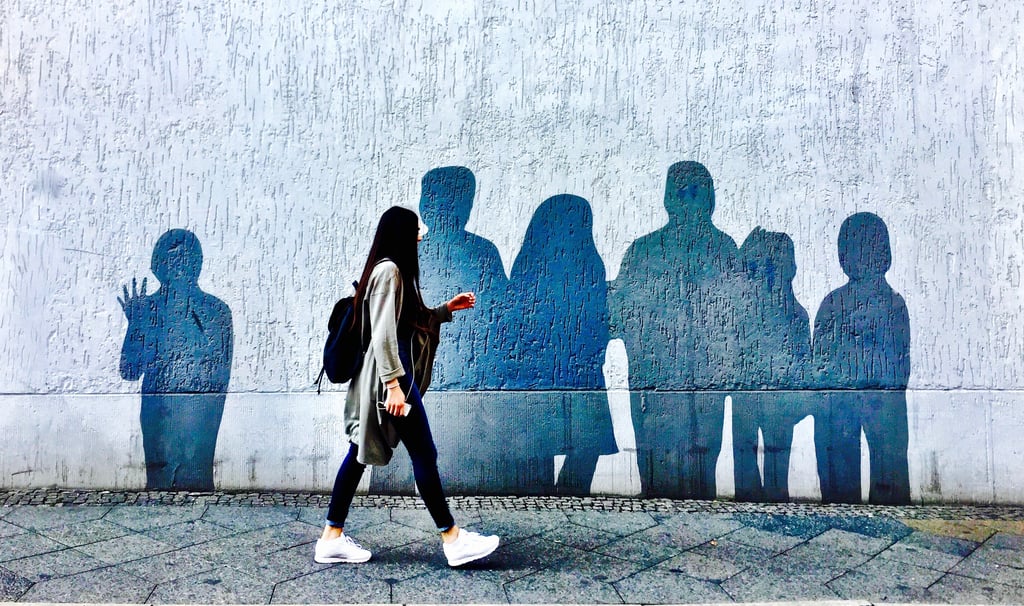

Laila came from Argentina to work as a nurse in Germany. The promise of a new life in such a culturally rich country was exciting, even if it meant facing some challenges. She dove headfirst into learning the language and was happy and curious to meet her new colleagues. The first shock: they didn’t seem that happy about her being there.
First came the comments about her accent. Then, the microaggressions started, leading to a sense of isolation that makes her question her decision every day.
This might sound like a one-off story, but unfortunately, it reflects the integration struggles in a country that desperately needs skilled workers.
Who are Lailas
To help change this scenario, the In Culture Project by the NGO Janainas is working on solutions to support both the “Lailas” (immigrants working in Germany-regardless of gender or profession).
The project also focuses on their colleagues and bosses, who, due to unconscious biases, may have behaviors that contribute to the team's discomfort.
A misaligned team can harm the productivity of all members and, ultimately, cause the loss of the qualified workforce that companies so desperately need.
The first step was to conduct a survey with the “Lailas” to better understand the problem. The survey was shared in groups and on platforms mainly used by immigrants in Germany and received 92 anonymous responses. While the results are not statistically representative, the goal is to outline the landscape and start the conversation.
It’s also important to note that, since the survey didn’t reach many Muslim groups (most respondents were Western Christians), religious bias is likely underrepresented in the findings.
The next steps include interviews with employers and colleagues to get a fuller picture.
Janainas e.V., the organization behind the project, is a nonprofit founded by Brazilian women in Berlin, focused on empowering migrant women and helping them use their skills for better inclusion in German society.
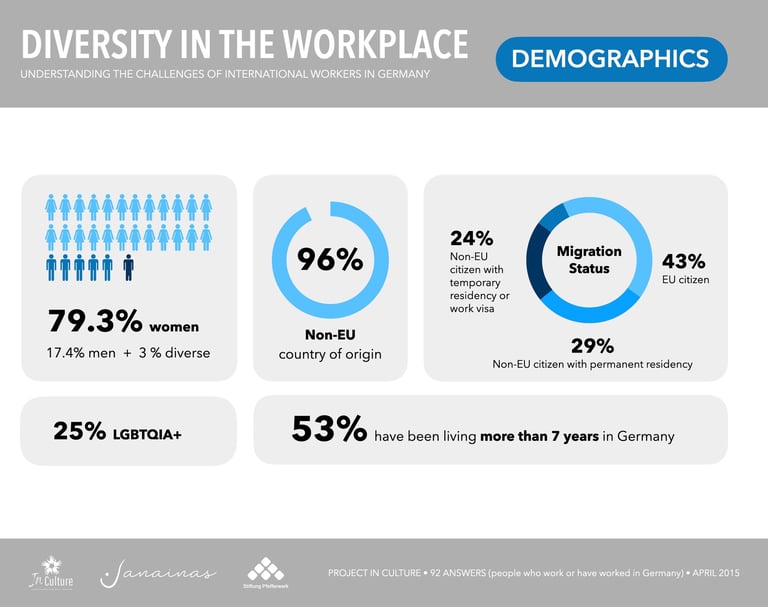

We noticed that most respondents are women from countries outside the European Union who have lived in Germany for more than 7 years. All individuals work legally in the country.
THE BIGGEST CHALLENGES
A small number of interviewees reported never experiencing discrimination or spoke about overcoming the problem by seeking legal help, changing jobs, or learning about regulations.
Interestingly, even after living in the country for so many years, more than 70% still consider the language barrier their biggest challenge. People report being passed over for promotions because their German wasn't "native enough", even when the company operated 100% in English.
The reasons are various: German has a complex grammatical structure that's very different from English (the current lingua franca in the Western world); additionally, many people work in companies where English is the official language. Interviewees report that difficulties in speaking German fluently or speaking with an accent led to judgments about their intelligence or competence.
Finally, integration with the local population, which would facilitate achieving fluency, is made difficult by cultural differences. Also because of biases (often unconscious), the next most frequently mentioned challenges are stereotypes and prejudice, which prevent immigrant workers' skills and knowledge from being recognized by colleagues.
Microaggressions appear quite frequently (those mean comments disguised as compliments or even small attitudes or behaviors that make the person feel excluded from the group).
Many interviewees reported unequal treatment at work: salary disparities, overlooked promotions, unjustified dismissals, and exclusion based on language.
"I've often heard 'You're very good for a Brazilian.'"
Cultural differences should be a source of richness, not a challenge. Perhaps this aspect represents the greatest opportunity as a vehicle for change—for everyone involved to understand the importance of cultural differences in enriching each professional's personal repertoire with clear benefits for the company.
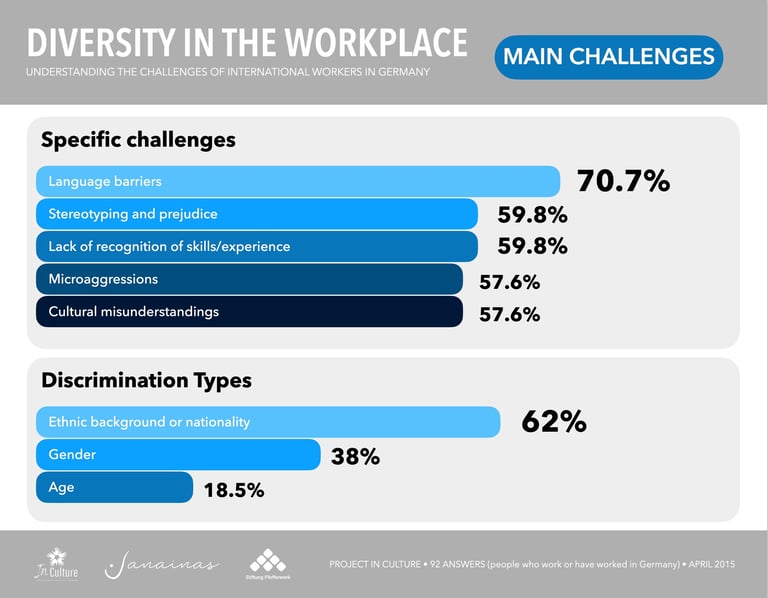

Regarding gender discrimination, several responses mention harassment, underestimation, or unfair treatment for being a woman, especially in male-dominated fields.
Here are some anonymous testimonials:
"I got pregnant and the supervisors wanted to end my project and send me back to Brazil." — a poignant example of both gender and nationality discrimination.
"Performance evaluations... my feedback is that I need to smile more." — an example of subtle microaggression. "
A coworker morally and sexually harassed me... said things like: 'you are stupid, but you smell very good.'" — a disturbing account of workplace abuse.
"When I was hired, I thought my salary offer was fair, but after joining the company I realised it was much lower than my German/male colleagues for the same role and level of seniority" — a example of migration pay gap.
"German men much less qualified or competent than me... earn more... while I have been consistently prevented from getting a promotion." — a reflection of compounded gender and racial bias.
The following chart summarizes the themes, number of mentions, and examples of responses.
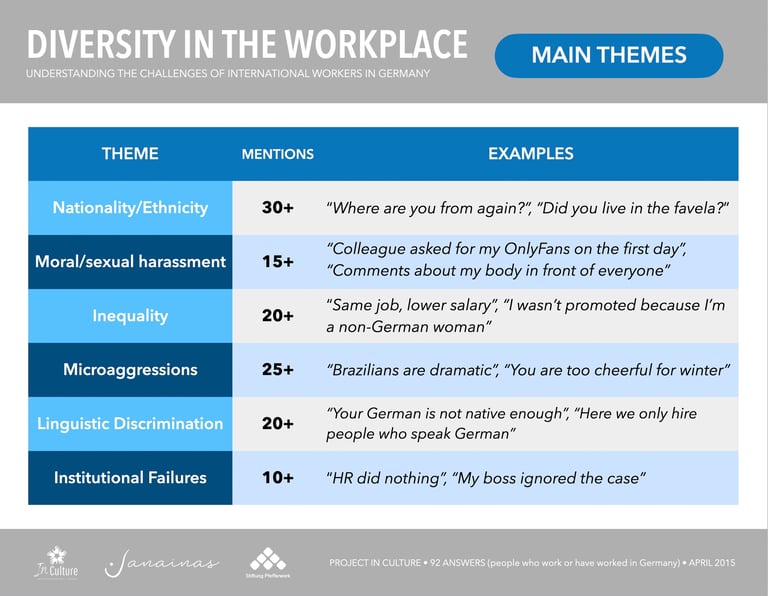

In summary, the data shows that ethnic origin/nationality is consistently one of the most reported forms of discrimination. And also:
Gender-based discrimination frequently intersects with discrimination based on ethnic origin/nationality.
Age-related discrimination appears as a significant factor, especially when combined with other forms of discrimination.
The results suggest that discrimination based on ethnic origin/nationality is the most prevalent form across different demographic groups, often occurring in combination with other forms of discrimination, such as gender and age.
FEELINGS AND PERCEPTIONS
The tone of the open-ended questions, where respondents could share personal cases, gives an idea of the type of feeling shared by these workers.
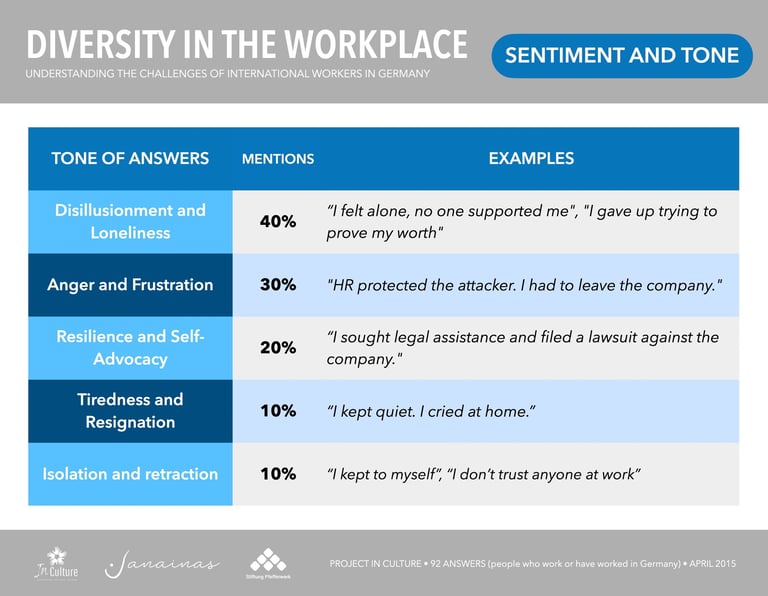

WHERE TO FIND SUPPORT?
Regarding the search for support, both the HR department, as well as managers and institutional policies, are seen as ineffective or negligent when facing complaints. There are many cases of retaliation or isolation after reporting discrimination. Some people sought legal support, documented the abuses, or verbally confronted the offenders.
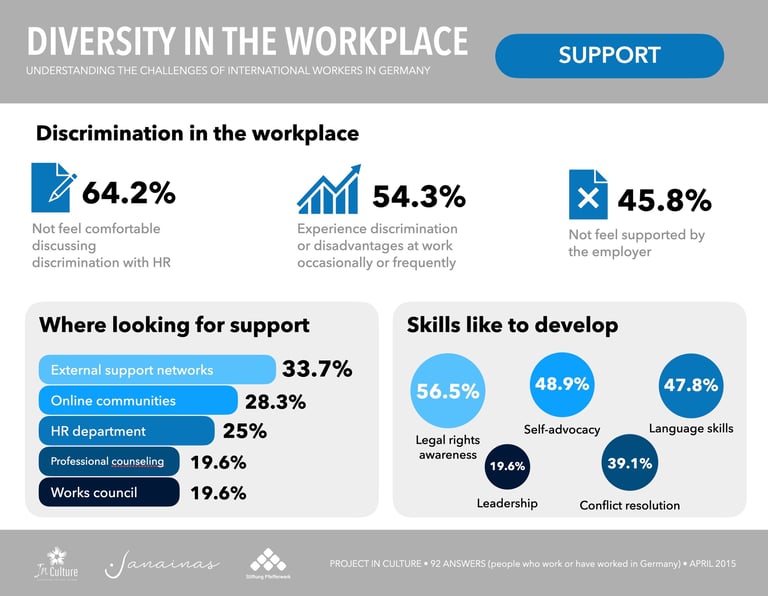

The main strategies used, especially among women, are alliances with other immigrants or vulnerable groups, particularly in online groups (social media).
Many reported that structures like HR, management, or diversity policies failed to offer real support. Although some participated in ERGs (Employee Resource Groups), many considered them superficial or ineffective.
"My boss suggested a 'Diversity Session' — which only made things worse*"*
In summary:
Formal structures (HR, DEI) are often ineffective, leading employees to rely on informal networks with colleagues in similar situations.
Many experience isolation, either due to hostile environments, lack of diversity, or fear of retaliation ("Avoid Germans," "Stay quiet").
Coping strategies vary: some seek alliances, others opt for passive adaptation or leave their jobs.
Criticism of corporate performativity: diversity initiatives exist but fail to truly protect or include.
CONCLUSIONS
The survey provided plenty of material, with abundant examples, giving us the opportunity to get a more accurate idea of the real situation. Some insights we could infer:
Real support comes from peers, not systems
Informal networks (other immigrants, women, POCs) are the main source of support, not corporate structures.
Toxic environments lead to exodus
When discrimination persists, leaving is often the only viable solution.
Need for structural change
Companies need to go beyond "performing" diversity and ensure real mechanisms for protection and inclusion.
Resilience ≠ Solution
Demanding that minorities "adapt" or "endure" ignores the responsibility of organizations to combat biases.
The next steps for developing a solution proposal are still in progress, but some preliminary ideas can already be considered, based on the study's conclusions.
Create self-managed support networks (e.g., immigrant groups with company sponsorship but with independence).
Train leaders in unconscious bias with a focus on real consequences and practical day-to-day exercises (not just theory).
Establish anonymous reporting channels with external investigations to prevent retaliation.
This testimony brings a strong vision of the immigrant worker in Germany:
"Understand that not everything is personal, that the prevailing racist and colonial structures are bigger than you and have existed for longer, and that, because of how this affects you, you should not compare yourself to natives. Remember your history and how much you have already evolved."
And this other one also presents a point to consider: "There are more nice Germans than a**holes, just like every country."
We still have a long way to go, but correctly identifying the problem is certainly an important and decisive step.
We believe that awareness and admission of the existence of these issues will greatly help companies not to lose precious and increasingly scarce human resources (qualified workforce), in addition to increasing productivity, reducing employee turnover, and enhancing innovation capacity, which largely depends on the level of diversity of the team.
And above all, we are working to ensure that Laila doesn't regret her decision to come work in Germany, and that her colleagues welcome her and recognize the importance and value of her work.
If you’d like updates or news about the project, visit Janainas’ page!
